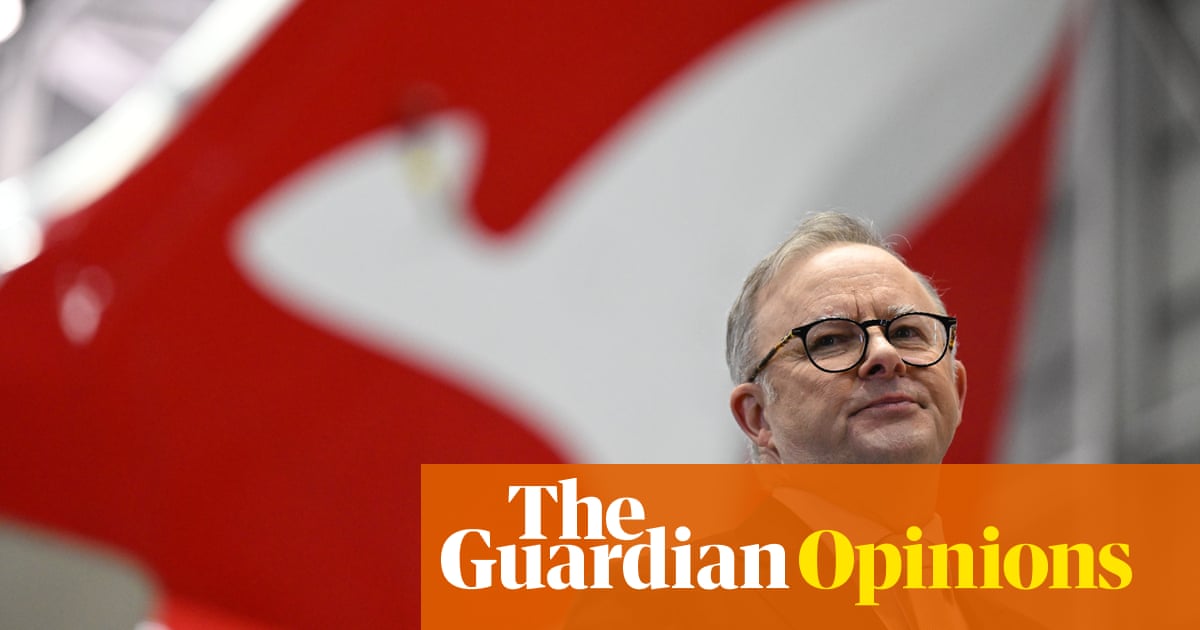
“There is no company in Australia that immediately says ‘Australia’ like this brand of Qantas.” That was Anthony Albanese in mid-August, when Qantas announced its corporate support for the voice referendum, including the launch of a new Yes23 livery. His gratitude for this support was understandable, even the reference to “brand” hinted that the symbolism might not be matched by substance.
Fast-forward a couple of weeks, the focus has turned to dollars and cents, and Albanese’s tone has changed. He called on Qantas to abandon expiration dates on flight credits issued during the Covid lockdowns. Qantas still owes a startling $370m and it was revealed yesterday that its Jetstar subsidiary owes a further $100m.
That wasn’t the only thing revealed yesterday. The Australian Competition and Consumer Commission announced that it will take Qantas to court, alleging it was advertising and selling tickets for more than 8,000 flights that it had already cancelled in its system. It is speculated that the motive here is to maintain control of landing slots at airports, particularly Sydney.
These problems came shortly after the revelation that the government acted to protect Qantas from the competitive threat posed by Qatar Airways, at an estimated cost to consumers of $1bn a year.
And, for those without the time or inclination to delve back further, it also followed the news that Albanese’s 23-year-old son had been given membership of the luxury Qantas Chairman’s Lounge, normally reserved for politicians and senior business figures – another clear indication of Qantas’s tight links with the Australian elite.
But running Australia’s most exclusive private club is just a marketing and lobbying arm for the real business of maintaining dominance of the Australian airline market. With a combined 60% market share, Qantas-Jetstar is the closest thing we have to a privately owned monopoly, outside the regulated utility sector. (Telstra, another Australian icon privatised under neoliberalism, is a distant second.)
All of this is justified by the perception, much encouraged by the company, that Qantas is Australia’s national flag carrier. This directly contradicts the rationale for Qantas’s privatisation in the 1990s, when it was claimed that the days of national airlines as essential public services were over. But Qantas has been happy to wrap itself in the national flag for political purpose, while vigorously denying that it has any obligations other than to maximise profit for its shareholders.
Does Qantas act as “The Spirit of Australia”? The experience of the pandemic shows us that Albanese’s claim (made at the Yes23 launch) that “Qantas has a long history of doing its bit to carry Australia” is the opposite of the truth. At a time of national crisis, our “flag carrier” could have stepped up and put its planes and staff at the service of the nation, organising low-cost repatriation flights and helping to deal with the logistical issues that plagued all kinds of supply chains.
Instead, after lobbying for its rival, Virgin, to be denied any support, Qantas raked in $1.5bn from jobkeeper and other schemes, designed to prevent large-scale job losses. Qantas illegally sacked thousands of workers, partly in order to strengthen its position in future industrial disputes.
Meanwhile, Australians stranded overseas were left in the lurch. While the decisions of the Morrison government were the primary cause, Qantas did not help. People spent months trying to get home, paying massively increased fares when they could get them.
As the tide of public opinion turns against privatisation, it is possible that Qantas may one day be renationalised, as has happened to Air New Zealand. At that point, governments will have to decide how to manage an industry where competition has clearly failed. But in the meantime, this rapacious corporation should not be the recipient of political favours.
Even if the Albanese government is not convinced by the case for open competition, it should be more alert to the political dangers associated with its close embrace of Qantas.
John Quiggin is a professor at the University of Queensland’s school of economics












